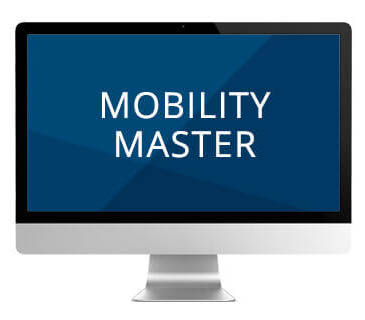Overview:
Work environments are transforming to digital workplaces, with billions of mobile workers using their mobile devices for business critical services. Mobility, IoT and business critical applications are enabling these workers to be more productive and efficient, but at the same time driving up the demands on the network.
To enable an always-on network with the desired performance and user experience, enterprises must deliver an intelligent WLAN with advanced technologies to be more predictive, enable always-on connectivity, and improve network efficiency.
Aruba Mobility Master
The Aruba Mobility Master is the next generation of master controller that can be either deployed as a virtual machine (VM) or installed on an x86-based hardware appliance. The Mobility Master provides better user experience, flexible deployment, simplified operations and enhanced performance. Existing Aruba customers can migrate their master controller configuration and licenses over to the Mobility Master and start taking advantage of these unique capabilities.
Flexible Deployment
Customers have the flexibility of deploying a VM or an x86-based hardware appliance depending on their environment and needs. Customers who already have a VM environment can benefit from ease of operation and right-size their VM by adjusting their CPU or memory. Moving to a VM-based deployment that has more memory and compute allows you to manage more services on the network. The Virtual Mobility Master can run on open source KVM or VMware ESXi hypervisor.
Features:
Simplified Operations
Centralized configuration and visibility
The Mobility Master consolidates all-master, single mastermultiple local, and multiple master-local deployments into a single deployment model. ArubaOS 8 uses a centralized, multi-tier architecture under a new UI that provides a clear separation between management, control, and forwarding functions. The entire configuration for both the Mobility Master and managed devices is set up from a centralized dashboard, thereby simplifying and streamlining the configuration process.
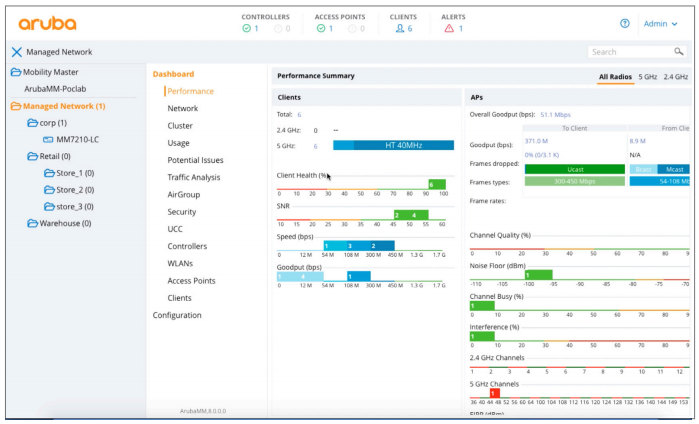
Figure 1: ArubaOS dashboard
Improved upgrades
The Mobility Master introduces the ability to dynamically update individual service modules (AppRF, AirGroup, ARM, AirMatch, NBAPI, UCM, WebCC and IP classification) that are residing on the Mobility Master, without requiring an entire system reboot.
Muli-tenant wireless network with MultiZone
The new MultiZone feature in ArubaOS 8 allows IT organizations to have multiple and separate secure networks while using the same Access Point ( AP). Historically if you wanted to have 2 secure networks in one physical location you had to have 2 separate APs which would create RF interference and be costly. With MultiZone enabled, one AP can terminate 2 different SSIDS on 2 different controllers. The data is encrypted from the client to the controller. When the data is flowing through the AP it is still encrypted.
This means the networks are completely separate and secure even though the traffic runs through the same AP. This feature is very useful for federal, airport, retail or office buildings as it allows for easy policy implementation in environments where data privacy, separation and network security are critical.
In Figure 2 we show how MultiZone can be deployed in environments with multiple networks running from the same access point. In an airport for instance, there can be separate networks for the airlines, public and airport security that run off the same access point. The airport security Wi-Fi runs their network through their controller, while the airport public Wi-Fi runs through a public Wi-Fi controller – and all are using the same access point. In government use cases, you can run both classified and non-classified networks from one access point, with complete separation of data passing through their own respective controllers.
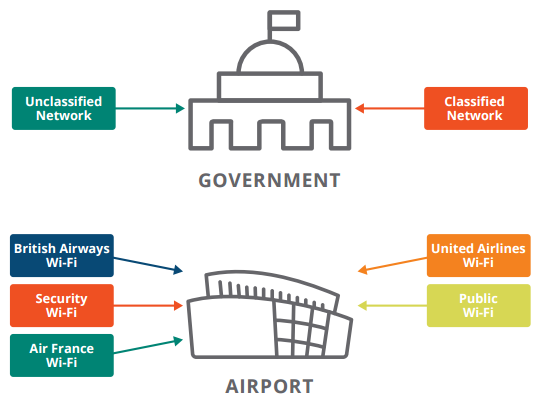
Figure 2: MultiZone use cases
Better Stability and User Experience with Controller Clustering
Massive traffic is hitting the network from mobile devices, IoT and business critical applications. Users expect no interruption in their mobile experience. Controller Clustering enables that seamless experience across giant campuses, in the event of a failure or significant crowd density. Clustering provides the following benefits for a better user experience.
- Hitless failover – Users will not notice any issues in the rare event of a controller failure. Voice calls, video, data transfers would all continue without noticeable impact. User session information is shared across controllers in the cluster to ensure there is no single point of failure for any user.
- Automatic user load balancing – Users are distributed evenly across controllers to prevent congestion on a single controller. This ensures a large amount of available throughput for each user even when massive crowds gather.
- Seamless roaming – Users do not experience any delays while moving through a large campus while on mission critical applications such as a Skype for Business call. All of the controllers in a cluster work together to manage the users. A user can roam across 10,000 APs without ever getting a new IP address, re-authenticating, or losing firewall state information.
In Figure 3 we have 8 clients spread out evenly across 3 controllers. In Figure 4, in the event of a failure of the Controllers 1 and 2 all 8 clients move over to controller 3 – making sure users are not affected from the controller failure.
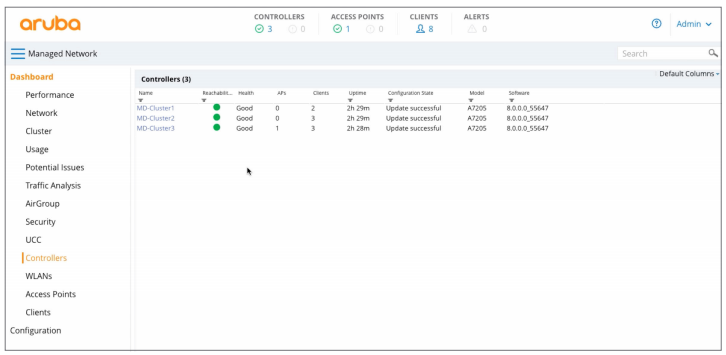
Figure 3: Clients are load balanced between controllers
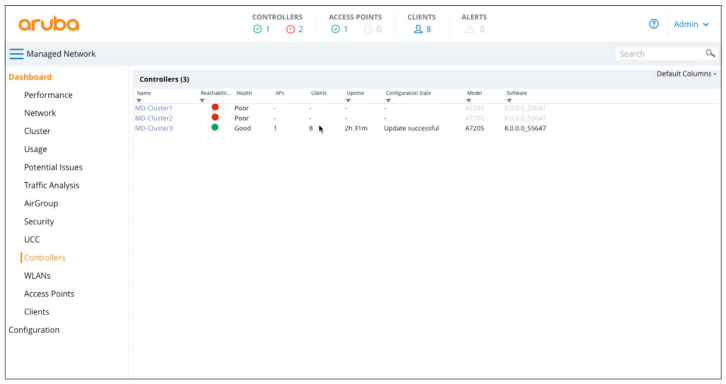
Figure 4: Clients failed over to one controller in the event of a failure
Enhanced WLAN Performance
The Mobility Master with ArubaOS 8 extends the capabilities of the Aruba WLAN to be more intelligent. AirMatch intelligently automates Wi-Fi tuning, while the NorthBound APIs provide unparalleled visibility to the network and AppRF customization brings better application user experience.
High performance Wi-Fi with AirMatch
ArubaOS 8 enhances the Adaptive Radio Management (ARM) technology with AirMatch – the new RF optimization system. AirMatch is designed with the modern RF environment in mind. AirMatch is tuned for noisy and high density environments with scarce clean or free air space. It gathers RF statistics for the past 24 hours and proactively optimizes the network for the next day. With automated channel, channel widths and transmit power optimization, AirMatch ensures even channel use, assists in interference mitigation and maximizes system capacity.
The capacity optimization is not just co-channel interference mitigation. AirMatch will also dynamically adjust channel width. This ensures the best network capacity whether you are in a high density environment like a lecture hall (20 MHz channels) or low density environments (80 MHz channels).
Client devices often make mistakes. AirMatch will minimize EIRP variances across the network to give clients the best chances to make the right decisions. ClientMatch will step in to help the clients that may still behave poorly.
| AirMatch Benefits |
| Even channel assignment |
Provides even distribution of radios across available channels, interference mitigation and maximized system capacity |
| Dynamic channel width adjustment |
Dynamically adjusts between 20MHz, 40MHz and 80MHz to match the density of your environment |
| Automatic transmit power adjustment |
Examines the entire WLAN coverage and automatically adjusts the transmit power of APs to ensure the best coverage and user experience |
North-bound APIs (NBAPI) for increased network intelligence
Mobility Master has a full set of northbound APIs that enable deep visibility into the network. The NBAPIs provide RF health metrics, app utilization, device type and user data in an easy to integrate format. 3rd party applications can receive information from the controller and analyze all these metrics for better visibility and monitoring.
AppRF Customization
AppRF brings application awareness to WLANs. It uses deep packet inspection to identify enterprise, cloud and mobile apps. It also enables IT to prioritize applications per user and device. Now in ArubaOS 8 we are extending the App RF capabilities by adding the capability for customers to define custom application and application categories to get a better user experience.

